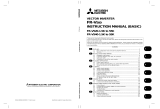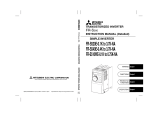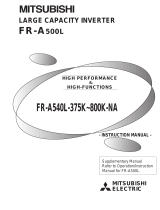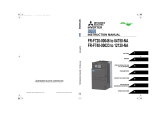Page is loading ...

TRANSISTORIZED INVERTER
INSTRUCTION M ANUAL
HEAD OFFICE:MITSUBISHI DENKI BLDG MARUNOUCHI TOKYO 100-8310
Printed in JapanIB(N A )-0600041-A(0007)M EE
FR -A L
COM BINATION CONTROLLER
Specifications subject to change w ithout notice.

A-1
Thank you for choosing this Mitsubishi transistorized Inverter option.
This instruction manual gives handling information and precautions for use of this
equipment.
Incorrect handling might cause an unexpected fault. Before using the equipment,
please read this manual carefully to use the equipment to its optimum.
Please forward this manual to the end user.
This section is specifically about safety matters
Do not attempt to install, operate, maintain or inspect this product until you have
read through this instruction manual and appended documents carefully and can
use the equipment correctly.
Do not use this product until you have a full knowledge of the equipment, safety
information and instructions.
In this instruction manual, the safety instruction levels are classified into
“WARNING” and “CAUTION”.
WARNING
Assumes that incorrect handling may cause hazardous
conditions, resulting in death or severe injury.
CAUTION
Assumes that incorrect handling may cause hazardous
conditions, resulting in medium or slight injury, or may
cause physical damage only.
Note that the CAUTION level may lead to a serious consequence according to
conditions. Please follow the instructions of both levels because they are important
to personnel safety.

A-2
SAFETY INSTRUCTIONS
1. Electric Shock Prevention
WARNING
While power is on or when the inverter is running, do not open the front cover.
You may get an electric shock.
Do not run the inverter with the front cover removed. Otherwise, you may access
the exposed high-voltage terminals or the charging part of the circuitry and get
an electric shock.
If power is off, do not remove the front cover except for wiring or periodic
inspection. You may access the charged inverter circuits and get an electric
shock.
Before starting wiring or inspection, switch power off, wait for more at least 10
minutes and check for the presence of any residual voltage with a meter etc.
Earth the option unit.
Any person who is involved in the wiring or inspection of this equipment should
be fully competent to do the work.
Always install the inverter before wiring. Otherwise, you may get an electric
shock or be injured.
Operate the switches with dry hands to prevent an electric shock.
Do not subject the cables to scratches, excessive stress, heavy loads or
pinching. Otherwise, you may get an electric shock.
2. Fire Prevention
CAUTION
Mount the option unit on an incombustible surface. Installing the inverter or
option unit directly on or near a combustible surface could lead to a fire.
If the inverter has become faulty, switch off the inverter power. A continuous flow
of large current could cause a fire.
3. Injury Prevention
CAUTION
Apply only the voltage specified in the instruction manual to each terminal to
prevent damage etc.
Ensure that the cables are connected to the correct terminals. Otherwise,
damage etc. may occur.
Always make sure that polarity is correct to prevent damage etc.
While power is on and for some time after power-off, do not touch the option unit
as they are hot and you may get burnt.

A-3
4. Additional instructions
Also note the following points to prevent an accidental failure, injury, electric shock, etc.:
(1) Transportation and installation
CAUTION
When carrying products, use correct lifting gear to prevent injury.
Do not stack the inverter boxes higher than the number recommended.
Ensure that installation position and material can withstand the weight of the
option unit. Install according to the information in the Instruction Manual.
Do not operate if the option unit is damaged or has parts missing.
Do not stand or rest heavy objects on the option unit.
Check the option unit mounting orientation is correct.
Prevent screws, wire fragments, conductive bodies, oil or other flammable
substances from entering the option unit.
Do not drop the option unit, or subject it to impact.
Use the inverter under the following environmental conditions:
Ambient
temperature
-10°C to +50°C (non-freezing)
Ambient humidity 90%RH or less (non-condensing)
Storage
temperature
-20°C to +65°C*
Ambience
Indoors (free from corrosive gas, flammable gas,
oil mist, dust and dirt)
Environment
Altitude, vibration
Maximum 1000m above sea level for standard
operation.
5.9 m/s
2
or less (conforming to JIS C0911)
*Temperatures applicable for a short time, e.g. in transit.
(2) Trial run
CAUTION
Check all parameters, and ensure that the machine will not be damaged by a
sudden start-up.
(3) Operation
WARNING
Do not modify the equipment.

A-4
(4) Emergency stop
CAUTION
Provide a safety backup such as an emergency brake which will prevent the
machine and equipment from hazardous conditions if the inverter or option fails.
(5) Maintenance, inspection and parts replacement
CAUTION
Do not carry out a megger (insulation resistance) test on the control circuit of the
option unit.
(6) Disposing of the inverter
CAUTION
Treat as industrial waste.
(7) General instructions
Many of the diagrams and drawings in this instruction manual show the inverter
without a cover, or partially open. Never run the inverter like this. Always replace
the cover and follow this instruction manual when operating the inverter.

CONTENTS
1. STRUCTURE...........................................................................1
2. INSTALLATION.......................................................................2
3. WIRING ...................................................................................3
4. ADJUSTMENT ........................................................................ 5
5. SPECIFICATIONS...................................................................6
6. OUTLINE DRAWING............................................................... 7
FR-AL COMBINATION CONTROLLER
The "FR-AL" combination controller is designed to enable joint operation under the
control of the voltage signal (0 to 5VDC, 0 to 10VDC) from other equipment in the
"AUTO" position of the select switch (CS1) or independent manual operation with the
knob provided on the controller in the "MANUAL" position.

1
1. STRUCTURE
FR-AL
Forward rotation start switch (FWD)
Terminal block
Frequency setting
Mounting foot
Mounting screw 4-M4
Mounting foot
Frequency meter
Calibration resistor
Automatic/manual
Reverse rotation
(AUTO/MANUAL)
(SPEED)
select switch
start switch (REV)
potentiometer
Fig.1 Structure

2
2. INSTALLATION
The controller can be installed by fastening the mounting feet with screws (4 screws).
The mounting dimensions are shown in Fig. 2.
(
Note) Install the unit after wiring the terminal
block.
When changing the wiring after
installation, removal of the mounting
screws (4, M4 screws) in the front panel
allows you to remove only the unit, leaving
the mounting feet behind.
50
190
4-M4 screw
Fig. 2 Mounting Dimensions
Embedding the controller in a panel etc.
(1) Cut the mounting panel to the mounting hole
dimensions in Fig. 3.
(2) Take off the mounting screws (4 screws) in
the controller front panel, and remove the
mounting feet.
56
170
162
68
Square
4-M4 screw
hole
Fi
g
. 3 Embeddin
g
Dimensions

3
3. WIRING
3.1 Circuit Structure and Connection Method
IM
Motor
[REV]
FR-AL
R
S
W
OCR
U
V
R
S
T
STF
STR
SD
10
2
5
NFB
AC200V 50Hz
200/220V 60Hz
R
S
T
T
400/200
NFB
R
S
FR-AL
Hz
RA
CB
[AUTO]
[MANUAL]
AUT
MAN
COM
10
2
5
F
12
5
[FWD]
STF
STR
SD1
SD2
Link
FM
FM
+
Wiring for use with
(0 to 10V)
0 to 5V
Power supply
Inverter
Frequency setting
potentiometer
VRS
[SPPED
SET]
RA
Forward rotation
Reverse rotation
Frequency meter
Calibration
400V class inverter
DC
Inverter
resistor
Fig. 4 Connection Diagram and Wiring Example

4
3.2 Circuit Explanation
The circuit consists of the automatic (AUTO) and manual (MANUAL) selector
circuit, start (forward/reverse rotation) circuit, frequency setting circuit and
frequency meter circuit.
Selection between automatic (AUTO) and manual (MANUAL)
Moving the "AUTO"-"MANUAL" select switch (CS) to "MANUAL" energizes the
relay RA to disconnect the externally input frequency setting signal (across
automatic operation signal terminal 12-5), enabling the frequency setting signal to
be given to the inverter with the frequency setting potentiometer (VRS) on the
panel.
Moving the switch to "AUTO" outputs the externally input frequency setting signal
(joint operation signal) to be output (across terminals 2-5) unchanged,
disconnecting the output of the frequency setting potentiometer of this unit.
(Note) The above switching cannot be performed when no power (200V series) is
input to terminals R-S. Therefore, always make connection. Use a
transformer for the 400V series inverters.
3.3 Terminal Layout and Wiring Instructions
The terminal layout is shown in Fig. 5.
(1) Terminals SD1 and SD2 are connected by a link.
(2) Terminals marked * cannot be used as they are
provided for terminal mounting.
- Wiring instructions -
(1) The wiring distance between controller and inverter
should be 50m maximum and should be made as
short as possible.
(2) Use twisted or shielded cables for wiring the
frequency setting potentiometer (terminals 10, 2, 5),
and connect the shields to the common (terminal 5),
not to the earth. (Refer to Fig. 4.)
*
*
R
S
STF
STR
SD1
10
2
5
AUT
MAN
COM
SD2
FM
12
5
Fig. 5 Terminal Layout Diagra
m

5
4. ADJUSTMENT
Adjustment to be made for operation is to calibrate the frequency meter. The meter
may not indicate a correct value depending on the wiring distance, the inverter's
frequency meter output signal (terminal FM), etc.
Therefore, before starting operation, always refer to the following items and calibrate
the frequency meter.
Adjustment method
Start the inverter and turn the frequency setting potentiometer (VRS) to make the
voltage across inverter terminals 2-5 maximum (5V or 10V). In this state, make
adjustment with the calibration resistor (VRN) on the front panel until the frequency
meter deflects to full-scale (maximum frequency).
• Using the parameter unit to make adjustment
For digital inverters, the parameter unit can be used to make calibration. In this
case, make adjustment with the calibration resistor (VRN) in the fully clockwise
position. (Refer to the inverter instruction manual for the adjustment method.)
• The frequency meter is factory-adjusted to deflect to full-scale in the fully clockwise
position of the frequency setting potentiometer (VRS). However, when the FR-AL is
connected to the Z
200
or F
400
series inverters, the meter does not indicate the
maximum frequency. (About 70% indication)
Hence, always make calibration when using the unit with the aforementioned series
of inverters.

6
5. SPECIFICATIONS
Operation power supply voltage [Terminals R, S] 200VAC 50Hz, 200/220VAC 60Hz
Power consumption 1VA
Frequency setting input voltage [Terminal 10] 5V or 10VDC
Frequency setting output signal [Terminal 2]
0 to 5VDC
0 to 10VDC
Frequency setting potentiometer (VRS) 1kΩ 1W B characteristic
Frequency meter 1mA full-scale DC ammeter
Calibration resistor (VRN) 10kΩ 1/3W

7
6. OUTLINE DRAWING
AUTO
SPEED
STOP
STOP
FWD
MANUAL
FR-AL
6
5
4
7
8
9
10
3
2
1
0
REV
SET
70
90
120
70
50
10
5
5
5
200
190
180
7
5
5
10
160
MAX
20
*56
*170
*Mounting dimensions for embedding in a panel etc. (Refer to page 2)

REVISIONS
*The manual number is given on the bottom left of the back cover.
Print Date *Manual Number Revision
Jul., 2000 IB(NA)-0600041-A First edition
/



